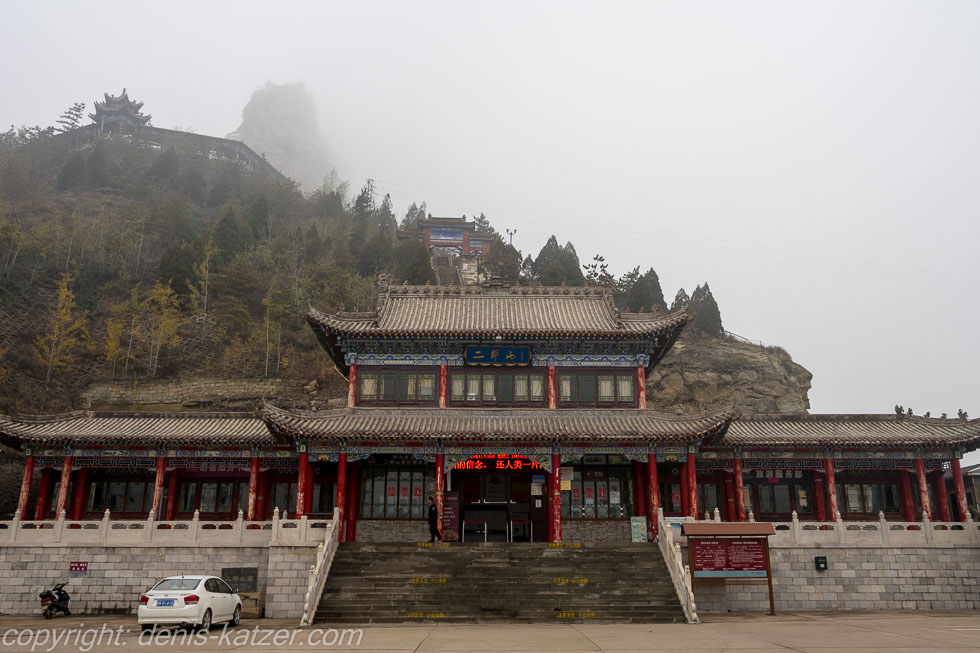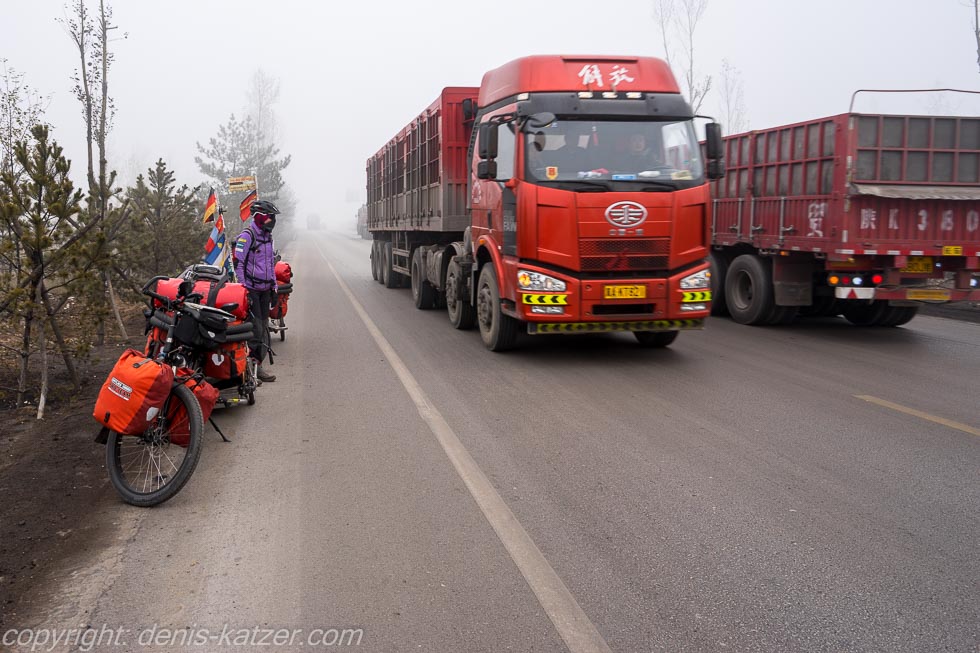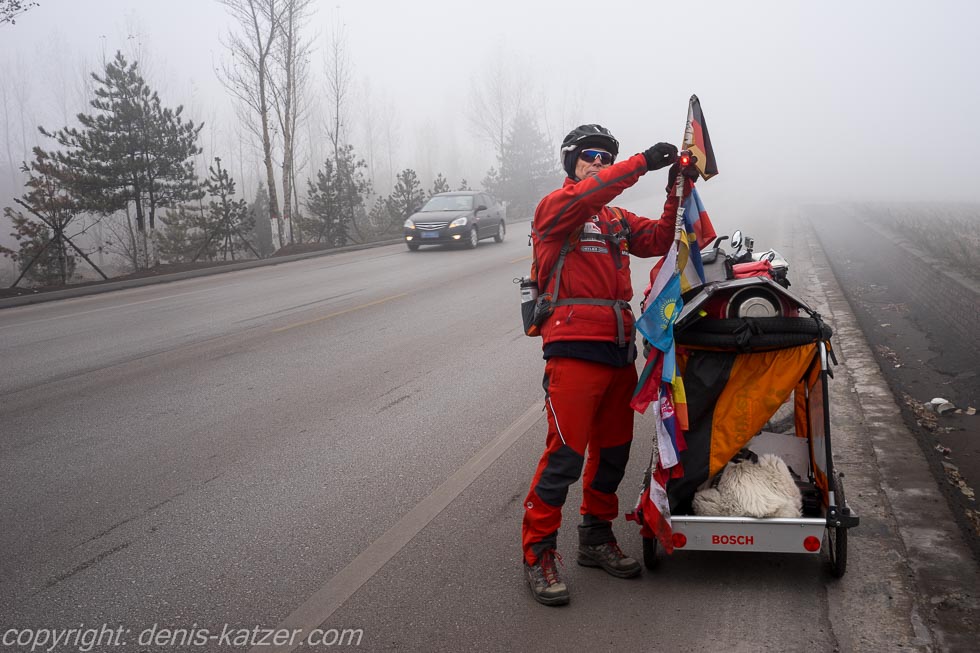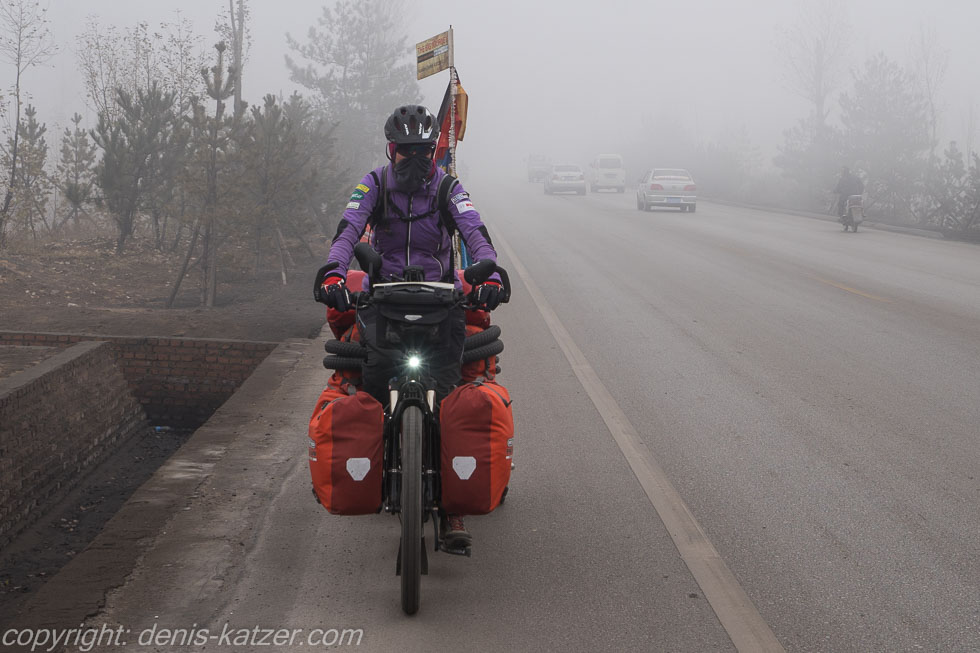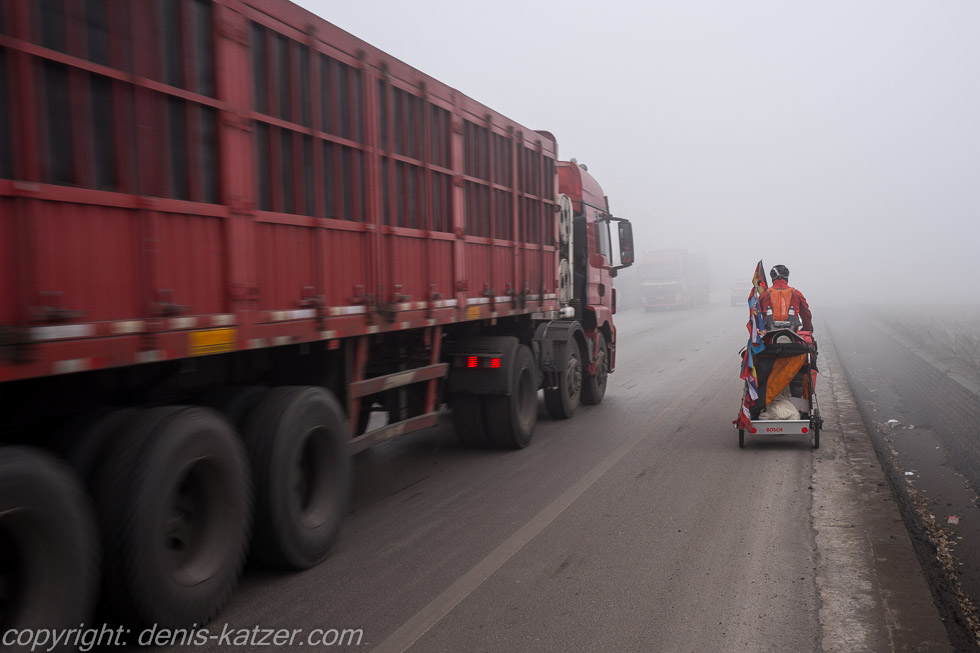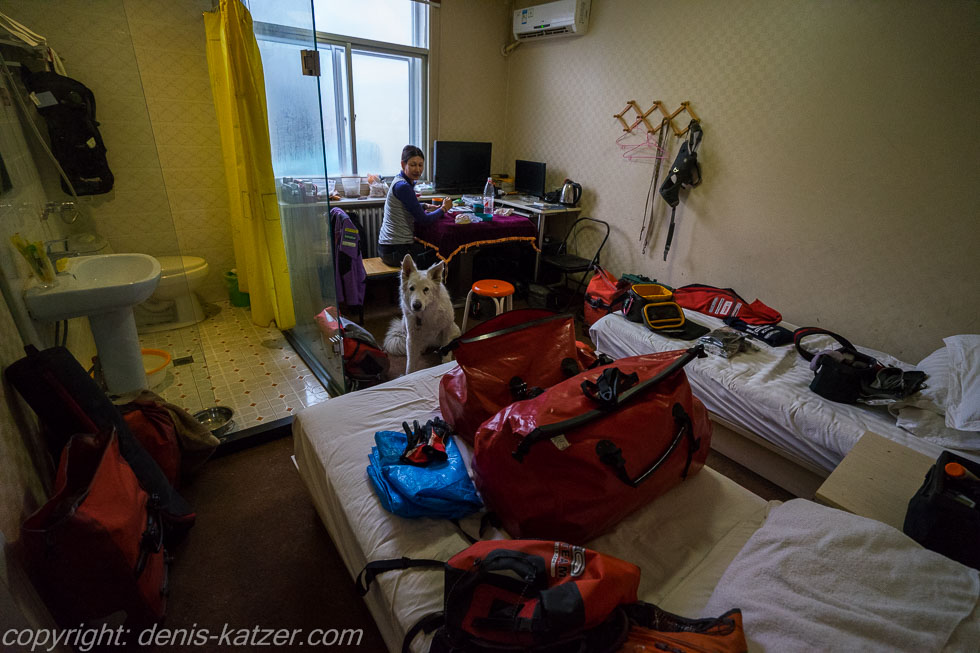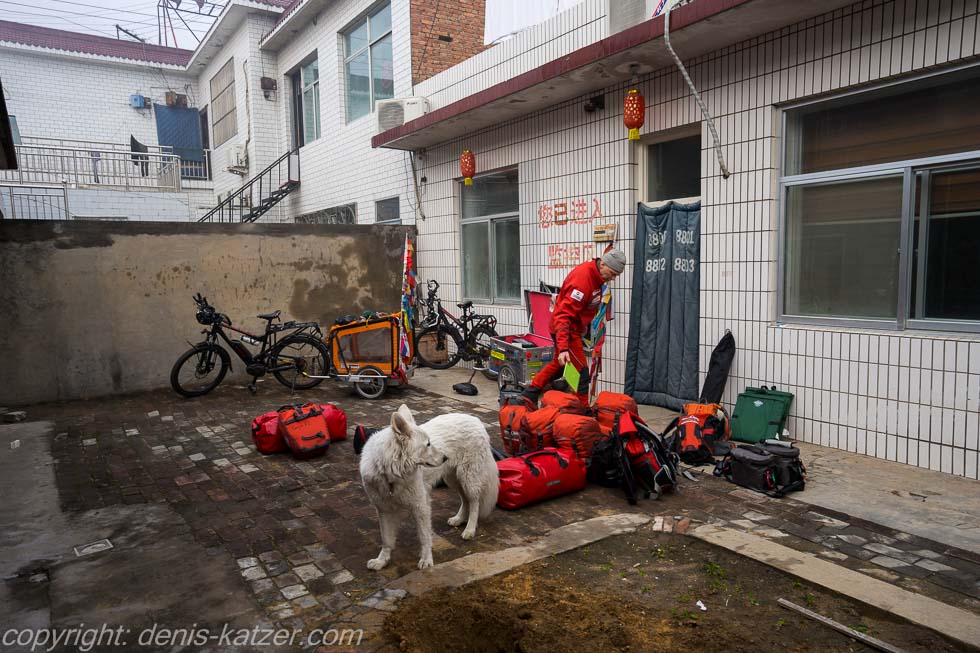
‘Wuuuuchchchch!’ it hisses from the fog
N 38°16'36.5'' E 109°43'11.3''
Date:
10.11.2015
Day: 135
Country:
China
Province:
Shaanxi
Location:
Yulin
Latitude N:
38°16’36.5”
Longitude E:
109°43’11.3”
Daily kilometers:
119 km
Total kilometers:
10,676 km
As the crow flies:
92.94 km
Average speed:
23.8 km/h
Maximum speed:
52.1 km
Travel time:
4:58 hrs.
Soil condition:
Asphalt
Maximum height:
1.250 m
Total altitude meters:
8.261 m
Altitude meters for the day:
730 m
Sunrise:
07:16 am
Sunset:
5:33 pm
Temperature day max:
8 °C
Temperature day min:
4 °C
Departure:
09:30 a.m.
Arrival time:
5:00 p.m.
Total plate tires:
8
Plate front tire:
2
Flat rear tire:
5
Plate trailer tire:
1
(Photos of the diary entry can be found at the end of the text).
Tuuuhhhhht! Tuuuhhhhht! Tuuuhhhhht!, it roars muffled but dangerously from the billowing fog. Visibility has suddenly reduced to perhaps 50 meters. Finding ourselves in a slowly drifting dense cloud, we cross a huge intersection that is supposed to guide the trucks coming from the highway onto the main road. “I can’t see anything anymore!” I shout, unable to shake off the feeling of rolling into the maw of a dragon. The engines roar all around us. To attract attention, the drivers of the smelly metal monsters invariably switched on their hazard warning lights. In addition, they keep pressing their ear-splittingly loud horns. We, on the other hand, only have our ridiculous bicycle bells, which not even pedestrians react to under normal conditions here in China. “We should put up our warning lights!” shouts Tanja. “Good idea!” I reply, stopping my bike as far to the right as possible after the junction. “Wuuuuchchch!” hisses one of the 38-ton trucks close to us. It’s actually madness to be out and about on a bike in weather conditions like this. But we have no other choice, we can’t avoid it. Due to a boundary wall on the right-hand side of the road, it is even impossible for us to simply push the e-bikes into the pampas to wait an hour or two for better weather. I nervously attach the warning lights to our trailers. Wuuuuchchch! Wuuuuchchch! Wuuuuchchch!, it hisses next to us without interruption, as if the heavily laden trucks were multiplying in the heavy fog. “Why is it taking so long?” asks Tanja, looking intently at the gray wall to keep an eye on the cars and trucks emerging from it. “I don’t believe it. I can’t get it to turn on!” I curse, apparently unable to operate a ridiculous on-off switch. As we are using our Lupin lights for the first time on this trip, I assume that the batteries have drained. “One more try,” I say, not giving up as they suddenly start flashing red and bright. “You have to press it twice in quick succession to activate it,” I explain to Tanja, who was about to ask me why the lights are suddenly working. “Fucking technology,” I continue to curse. You now need a control unit to switch on a bicycle rear light that offers various functions. Of course, the light is not to blame as I could have read the operating instructions beforehand. However, every little device, no matter how small, offers a wide range of functions that I can’t possibly remember. I’m thinking of my new smartphone, whose operating options are extremely extensive. But each app also has some detailed function variants. For example Whatsapp, the Chinese version WeChat, the wireless remote release for our cameras, but also the extensive operation of our photo and film cameras and the GoPro handlebar camera, laptop and tablet is remarkable. Not forgetting the software and the many programs, such as the translation program for the English texts, Lightroom to archive and label our many pictures during the trip, Photoshop for image editing, Google Maps for daily travel planning and setting up VPN access to be able to use the Google services that are blocked in China. Then there is the operation of our Facebook page, the filling of Instagram, the extensive updating of the website with our reports, photos and films. Even our backup battery offers a number of different operating options and requires technical understanding. We should also mention the Bosch on-board computer, the GPS system, the many chargers with different power supply units, even the operating instructions for our Suunto watches are more like a book than a manual. You have to master everything. And that’s just one part of the devices and software that are constantly changing like mutants. Sometimes I think back longingly to the time over 30 years ago when I started exploring the world with a small rucksack. Back then, there was little technology, no faulty software and life was decidedly freer than it is today.
The warning light makes us feel safer as we drive on. Suddenly an expensive Audi cuts me off. I just manage to brake to prevent something worse from happening. As I overtake the car, I see a smartly dressed young Chinese woman talking animatedly on her smartphone through the tinted windows. She didn’t notice a thing about the near miss. Just a few kilometers further on, it almost crashes again. A heavy three-wheeled cargo motorcycle almost runs me off the road as the driver overtakes me and then turns right just before me. Again I avoid the collision by braking hard. I shout at the man. I would have loved to have thrown him off the saddle in one fell swoop. “Stay calm Denis! Otherwise you’ll lose the flow!” warns Tanja behind me, sensing my anger. “Yes, yes. I know,” I reply, because I am aware that we have a very good chance of surviving such a bike trip unharmed if we move in this flow. The flow is a complete oneness with the current situation. A flow without anger, without fear, fully concentrated but not stressed. It is the moment when all my senses scan everything around me. As if my organism were a supercomputer that operates incessantly, detached from time and space, without having to exert itself in the slightest. Although the flow has something to do with high concentration, this state can be compared to a trance, a trance with full consciousness. It is the feeling that many extreme climbers and extreme athletes describe. A feeling in which I believe I have everything under control without any arrogance. There is no doubt that we can recognize, avoid or even prevent many supposed dangers early on in flow mode. But as soon as I fall into my emotions and aggression, the flow is broken and the unhappiness has the chance to manifest itself.
The sun slowly comes through. Eats its way to the earth’s surface. Visibility is suddenly good until a few low-hanging clouds push in front of the hot star again, causing the walls of fog and clouds of exhaust fumes to immediately suck in all colors, all visibility and all matter. For two hours, the strange weather alternates between visibility and sudden gloom. Power stations keep appearing next to or in front of us, their ugly plumes of smoke seeming to feed the fog. The coal dust is also unchanged and covers the land in its gray shroud. Is that bad for our health? Can our lungs take it? At a traffic light, a woman turns the corner. There are countless women and men like her, sweeping incessantly against the unspeakable avalanche of dirt with brooms tied together from twigs to stir it up even more. Many of them stand all day in a thick, billowing plume of dust. Many of them do not wear face masks. The woman next to us does everything she can to make our traffic light stop more difficult. Coughing, I ask for mercy. The street sweeper doesn’t even notice us. She does her job, no matter what is happening around her, no matter whether a poor Chinese man is preparing a simple meal at his bicycle garage kitchen. Everything is smothered in the swirling road dust. It seems to me that all sensitivity has been lost in the dirt, lost in the used oil floating on the side of the road.
The traffic, dust and dirt becomes unbearable outside the town of Yulin, escalating into a nightmare until the twelve-lane road gets closer and closer to the center. In this area, tanker trucks spray the entire main road with clean water to get rid of the dust. “I don’t believe it!” I shout in horror. We have often wondered why many streets in towns and villages were suddenly wet without it having rained. Here we witness the city council watering the asphalt. What an incredible waste when you consider that water will soon be worth more than gold in China. Unbelievable when you consider that water is our number one foodstuff and there is a shortage of it everywhere in China.
We drive past a dried-up, wide riverbed. Only a pathetic trickle wobbles through its center. Water is extracted from all the rivers in this country to keep the fields alive, it is needed to supply almost 1.4 billion people with drinking water, and around 300 million Chinese have no access to clean drinking water. A large proportion of the water is consumed by industrial plants. It even goes so far that the Heng He, the famous Yellow River, dries up for six months of the year at the end of its several thousand kilometer long migration through Tibet and China. This means that not a single drop will flow into the sea for six months because humans have more or less drunk up and used up the fourth largest river on earth.
Countless fields are laid out in the riverbed. As we drive past, we can see that some people are harvesting something green despite the late season. The cesspool stench that hits us from down there takes our breath away. I don’t even want to think about the lettuce, peppers, tomatoes and other vegetables harvested there ending up in the city’s restaurants and stores.
Although we sometimes book our accommodation online in advance, it is not easy to find in the cities. This is because the last two numbers are missing from the Google coordinates given. This inaccuracy means that the respective accommodation may be up to 500 meters away from the indicated point. Margaret now always sends us a photo of where we are staying, which we then show to people on the street.
“We’re here!” I say after we have reached the coordinate point in Yulin today too. There is no sign of a hotel here. Tanja pulls out her smartphone and shows the picture to a few passers-by. The usual crowd immediately forms around us. Discussions and deliberations take place. Some send us to the left, some to the right. One of the men enters the address into his smartphone to find the location using a Chinese map program. When he discovers our guesthouse, he sends us in the direction we have just come from. Another has the idea of calling the phone number Margaret sent. Bingo. The helpful man has reached the owner. He promises to pick us up immediately. Just ten minutes later, we follow his moped into the winding alleyways of Yulin’s hutongs. This time we would never have found our overnight accommodation on our own. Before we know it, we are standing in the courtyard of a hutong. The man unlocks a door to a small, foul-smelling, damp and cold room. Behind a room divider made of transparent, greasy glass, the toilet bowl gapes at us. Through the draughty window, dull light falls on the two beds, which fortunately have been freshly made up. My gaze falls on the old carpet, which is covered in countless burn holes. Is it the cause of the cloacal stench? Or has something died in the air conditioning system? “And we’re supposed to stay there?” I ask, shocked. “Don’t they have a room on the second floor?” I want to know. “Bu”, (No) is the answer. We have no choice but to move all our belongings into the damp Schimmelburg. Because we called this guesthouse to have the trailer drawbar and couplings sent to us, we have to wait until the important spare parts have arrived. “Oh, it stinks here,” I complain and switch on the air conditioning. Rattling, it begins its work and blows warm air into our crypt. “Don’t complain. We arrived safely. That’s what matters. Everything else is secondary. As soon as the drawbar arrives, we’ll get out of here. Until then, we’ll manage,” says my confident Tanja, calming the situation…
The live coverage is supported by the companies Gesat GmbH: www.gesat.com and roda computer GmbH www.roda-computer.com The satellite telephone Explorer 300 from Gesat and the rugged notebook Pegasus RP9 from Roda are the pillars of the transmission.
